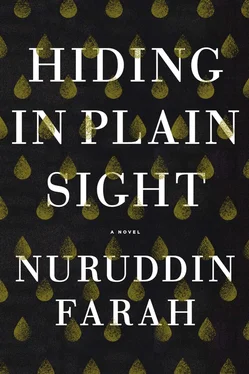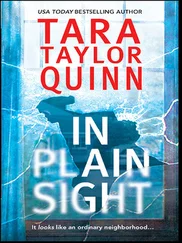The children are proud of her strong statement, she can tell. Especially Dahaba, who makes as though she might applaud.
Salif says, “Have you ever fancied women?”
“Never,” Bella replies.
“Not even tempted?” Dahaba asks.
“Never.”
Salif asks, “Did it ever cross your mind that our mother was inclined that way before you discovered it to be the case?”
“You never know what you know until you come to know that you know it,” Bella says. And then she gets to her feet and starts gathering the plates.
“Auntie is smart, isn’t she?” Dahaba remarks.
“Smart in her evasiveness,” Salif says.
Bella adds the plates to the mess in the sink. But she doesn’t speak of the tedious business of dishwashing. Instead, she says, “Any plans for today?”
“We’d like to visit Auntie Fatima and Uncle Mahdi and their children,” Dahaba says.
“I can you take there.”
“Can we sleep over?” asks Dahaba.
Bella thinks that Aar would not object. And she would love to see his dear friends again too.
“I’ll ring them,” Dahaba says. “And then we’ll do the dishes.”
Salif says, “We’ll make our beds.”
Bella goes up to her room to collect the presents she has brought for them. She has always wanted to share her knowledge of photography with them and regrets that she never found the time until now. She brings down two identical digital cameras, each with a manual. But Bella shows them the basics herself, along with a few shortcuts she knows.
“Can we show them to Zubair and Qamar?” says Salif.
“Of course you may.”
Dahaba takes a selfie and says, “How exciting!”
Everything is quiet, save for the clicking sound of Dahaba taking photos, now of Bella or Salif, now a selfie, and now of objects around the room. She is getting more excited by the second. But Bella’s mind has gone in a very different direction. She is imagining Death entering the scene again, depriving her and others of those they love. She remembers reading Roland Barthes’s prophetic answer to an interviewer: “If photography is to be discussed on a serious level, it must be described in relation to death.” She remembers vaguely that Fatima was having a medical procedure. What kind of procedure? she asks herself now. It is not the type of question to put to Dahaba at this very moment when she is enthralled with capturing life. She will ask Salif when the two of them are alone; maybe he will know. She says to Dahaba, after she has taken yet another photograph of her, “Now what did Auntie Fatima and Uncle Mahdi say when you rang the house?”
“They said we are most welcome,” says Dahaba.
“Only for an afternoon visit or for a sleepover?”
“Sleepover,” Dahaba insists.
“I want to hear one of them confirm it,” says Bella.
“Would you like to ring them now?”
“There is plenty of time before we go.”
Dahaba practices with the cameras a bit more, taking photos of Bella, then of Salif. They pose in ones and twos, and then take a selfie of all three of them.
Bella starts on the dishes. Salif, unasked, puts away his camera and begins to dry the plates. Bella remembers wanting earlier to tell him about not leaving the door open the way she found it when she came in with the shopping. But she is content to talk about this on another occasion. And, with him helping, they are soon done.
Bella leads the children upstairs and they help each other to make the beds, to turn off their computers, to draw the curtains, to put the wet towels on racks, and to flush the toilets. Then Dahaba and Salif pack their shoulder bags with a change of clothes and their toothpaste and toothbrushes. Dahaba gets Uncle Mahdi on the phone to confirm that she and her brother are welcome to stay the night.
Bella makes a call of her own in the privacy of her room: She telephones HandsomeBoy Ngulu, the lover who lives in Nairobi. They chat briefly, the first time they have spoken since her arrival. Of course, he has heard the tragic news, and he offers his condolences.
“If you are free this evening, maybe we can meet,” she says.
As soon as the words leave her mouth, alarm bells of worry ring in her head. She wonders if she is ready to meet a lover so soon after her brother’s death. But her heart’s quickened pace at the thought of it is pleasurable too. They agree to meet in the café of the Nairobi Serena, a five-star hotel.
Bella hides the papers she has brought home under the mattress in the master bedroom, just as her mother used to do, but she doesn’t yet dare bring in the carryall with Aar’s personal effects among which she found a set of house keys, which she will keep. She is glad the children are going to see their friends. It will be good for them not to be obligated to defer to an adult the entire time; she imagines this must be exhausting, like speaking a foreign tongue in which one is hardly proficient. It can’t have been easy to live in the house of your school principal and his wife, she thinks, no matter how kind they are. With their peers, they can be uninhibited and speak frankly, with everything up for open analysis and hearty discussion.
Still, she thinks, they’ve been lucky to be raised by Aar rather than in a traditional Somali household. And Aar, in turn, was lucky to be raised by Hurdo, who not only tolerated differences between people but also appreciated them. Aar’s playmates would be beaten at home by their parents if they talked back and the children seldom got a kind answer if they questioned an adult. In such a household, a child inevitably resorts to lying, sneaking around, and being evasive. Bella remembers the story of a boy whose father struck him in the face as they passed each other in a hallway of their home even though he had done nothing wrong. When the son asked him why, the father replied that the blow was “for the wrongs you will surely commit in the future.” Aar, she knows, never raised a hand to a child in his life.
Dahaba brings her mobile phone to Bella, indicating that Uncle Mahdi is on the line. Fatima and Qamar are out shopping, he says, but he hastens to add that they will be back by the time Bella and the children can drive there and that they are welcome to sleep over.
And so they set out, the car keys in Bella’s hand, and a set of house keys for her and Salif in the event the children get back when Bella is not in the house. Bella reminds herself to have a set made for Dahaba, who has never been trusted with keys because she has a habit of mislaying them. But Bella intends to make Dahaba more responsible for herself.
But when Bella wonders aloud if they should set the alarm and Salif concurs, Dahaba goes into an inexplicable panic. “Why set the alarm?” she says.
Bella says, “Why not?”
Dahaba says, “What if I come back alone and I can’t remember the code?” Her teeth are clenched, and her features are contorted with anxiety.
Bella reminds herself that there is now a before and an after in these children’s lives and that this new phase requires compassion. There is no sense in upping the ante, especially as Dahaba has a tendency to make a drama out of everything.
As a sibling, Salif is harsher, refusing to fall for what he calls Dahaba’s “exploits,” and it annoys him no end when tears get her what she wants from adults. Aar was well aware of her tactics, but worried that a heavier storm was brewing, he sometimes gave in to her demands. Bella too is familiar with this side of Dahaba, and while she thinks it is too soon to get confrontational, she knows that sooner or later she will have to face the challenge if she doesn’t want matters to get out hand.
“Will someone answer, please?” Dahaba says.
Читать дальше












